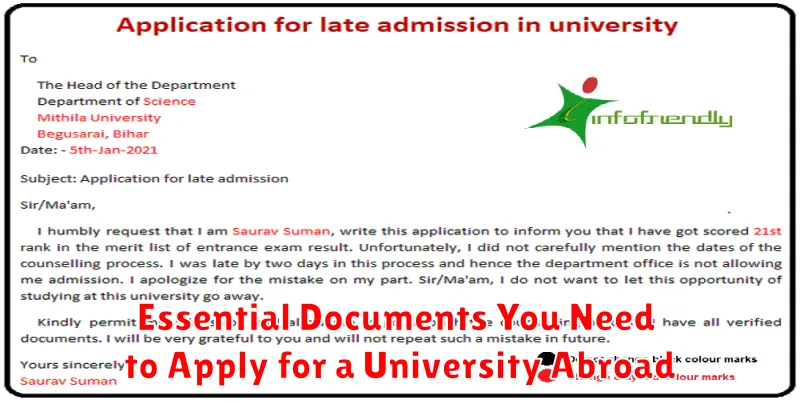Applying to a university abroad can feel like navigating a complex maze. From standardized tests like the TOEFL and IELTS to academic transcripts and letters of recommendation, the required documents can be overwhelming. This article provides a comprehensive guide to the essential documents you’ll need to successfully apply to a university abroad, helping you streamline the application process and increase your chances of acceptance. Understanding the necessary application requirements early on is crucial for a smooth and successful application experience.
Securing your place at a university abroad requires careful preparation and organization of your application documents. This guide breaks down each essential document, offering detailed explanations of their purpose and providing helpful tips on how to obtain them. From your passport and student visa information to financial documents and essays, we’ll cover everything you need to know to make your application stand out. Knowing the specific requirements for your chosen university abroad is paramount for a successful application.
Valid Passport and Visa
A valid passport is your most crucial identification document for international travel. Ensure its expiry date extends well beyond your intended period of study. Most universities require a passport validity of at least six months beyond the program’s duration.
A student visa is mandatory for studying in most countries. The specific visa requirements vary depending on your chosen destination and nationality. Begin the visa application process early, as it can be lengthy and require specific documentation. Consult the embassy or consulate of your target country for detailed information.
Academic Transcripts
Your academic transcripts are official records of your academic performance. They list all the courses you’ve taken, the grades you’ve received, and your overall GPA. Universities require these to evaluate your academic background and determine your suitability for their programs.
Ensure you request official transcripts from all secondary and post-secondary institutions you’ve attended. These must be sent directly from the institution to the university you are applying to. Some universities accept transcripts uploaded through their application portals, but always verify their specific requirements.
Proof of Language Proficiency (TOEFL/IELTS)

Most universities require international applicants to demonstrate their English language proficiency. This is typically done through standardized tests like the TOEFL (Test of English as a Foreign Language) or IELTS (International English Language Testing System).
Each university sets its own minimum score requirements. Check the specific requirements for your chosen program. Ensure you take the test well in advance of the application deadline to allow time for score reporting.
Letters of Recommendation
Letters of recommendation (LORs) are a crucial part of your university application. They offer a third-party perspective on your academic abilities, character, and potential.
Typically, you’ll need two or three LORs. Choose recommenders who know you well and can speak to your strengths. These are often professors, teachers, or research mentors. Ensure they can provide specific examples to support their claims.
Provide your recommenders with ample time to write your LOR. Giving them your resume or transcript, and discussing your goals for studying abroad, can help them craft a strong and personalized letter.
Statement of Purpose
The Statement of Purpose (SOP), sometimes called a Personal Statement, is a crucial part of your university application. It’s your opportunity to showcase your academic and personal background, explain your reasons for choosing the program, and highlight your future aspirations.
This document allows the admissions committee to understand your motivations, assess your fit for the program, and evaluate your potential for success. A well-written SOP can significantly strengthen your application.
Curriculum Vitae (CV)
A Curriculum Vitae (CV) provides a comprehensive overview of your academic and professional background. It is a crucial document for university applications, especially for graduate programs and research-oriented courses. Unlike a resume, a CV is typically more detailed and can be several pages long.
Your CV should include sections such as education, research experience, publications, presentations, awards and honors, skills, and references. Tailor your CV to highlight experiences relevant to the program you’re applying for. Ensure the information presented is accurate and up-to-date.
Financial Proof or Sponsorship
Demonstrating financial stability is crucial for your university application. You must prove you can cover tuition fees and living expenses throughout your studies. This is typically done through bank statements, demonstrating sufficient funds.
If you’re receiving financial sponsorship from a person or organization, provide a formal sponsorship letter clearly stating the sponsor’s commitment to covering your expenses. This letter should ideally include the duration and amount of sponsorship.
Application Form and Fees
The application form is a crucial document. Ensure all information is accurate and complete. Application fees are typically non-refundable. Check the university’s website for the most up-to-date fee information and accepted payment methods.
Some universities may offer application fee waivers for students who meet specific criteria. Check the university’s website for information regarding eligibility requirements and how to apply for fee waivers.
Medical Certificate (if required)
Some universities require a medical certificate as part of the application process. This certificate serves as proof of your overall health and fitness to undertake academic studies. Check the specific requirements of your chosen university and program to determine if a medical certificate is necessary.
If required, the certificate typically needs to be issued by a licensed physician and may include information on your vaccination history, current health status, and any pre-existing medical conditions. Ensure the certificate is recent and meets the specified format and language requirements of the institution.
Portfolio (for creative programs)
A portfolio is a crucial component for applicants to creative programs like fine arts, design, architecture, music, or performing arts. It showcases your skills and creative potential, supplementing other application materials.
Carefully curate your best and most recent work. Follow any specific guidelines provided by the university regarding format and content. Present your work in a professional and organized manner.

